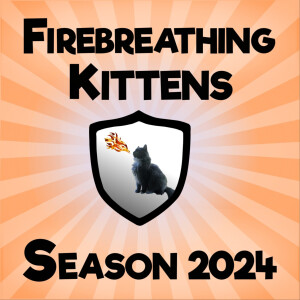Firebreathing Kittens
Firebreathing Kittens plays a different TTRPG every week. Four of the rotation of cast members will bring you a story that has a beginning and end. Every episode is a standalone plot in the season long anthology. There’s no need to catch up on past adventures or listen to every single release. You can hop in to any tale that sounds fun. Join as the Firebreathing Kittens explore the world, solve mysteries, attempt comedic banter, and enjoy friendship.
Episodes

Wednesday Oct 09, 2024
Wednesday Oct 09, 2024
Hospital visiting hours, accusations, ledgers recording foul deeds, storm clouds, missing cows, church sermons, and carriages. Core Delvelopment is a Darksome Delve actual play podcast.

Wednesday Oct 02, 2024
Wednesday Oct 02, 2024
Wrestling with Cases is an actual play episode of CBR+PNK. Bill, Nugh, and Rusty are hired to steal a case filled with unknown items that will help the town of Hardingwood.

Wednesday Oct 02, 2024
Wednesday Oct 02, 2024
Wrestling with Cases is an actual play episode of CBR+PNK. Bill, Nugh, and Rusty are hired to steal a case filled with unknown items that will help the town of Hardingwood.

Wednesday Sep 25, 2024
Wednesday Sep 25, 2024
Your Twist Is My Command is an actual play podcast of Twisted Wishes and Tricube Tales. Nugh, Ailbh, and Sadie fill in as temp genies, twisting the wishes to never grant exactly what the wishers want.

Wednesday Sep 25, 2024
Wednesday Sep 25, 2024
Your Twist Is My Command is an actual play podcast of Twisted Wishes and Tricube Tales. Nugh, Ailbh, and Sadie fill in as temp genies, twisting the wishes to never grant exactly what the wishers want.

Wednesday Sep 18, 2024
Wednesday Sep 18, 2024
Nasty, Marty, and Sadie get in touch with their primal sides as they attempt to save the world (per usual) before completely losing themselves to the beast within in this actual play podcast of Honey Heist.

Wednesday Sep 18, 2024
Wednesday Sep 18, 2024
Nasty, Marty, and Sadie get in touch with their primal sides as they attempt to save the world (per usual) before completely losing themselves to the beast within in this actual play podcast of Honey Heist.

Wednesday Sep 04, 2024
Wednesday Sep 04, 2024
On a plea from an injured pigeon, Bill and Sadie take to the skies to infiltrate a dangerous mountainside fortress, with more at stake than they realise... One Flew the Coup is an actual play podcast of Dicing With Death.

Wednesday Sep 04, 2024
Wednesday Sep 04, 2024
On a plea from an injured pigeon, Bill and Sadie take to the skies to infiltrate a dangerous mountainside fortress, with more at stake than they realise... One Flew the Coup is an actual play podcast of Dicing With Death.

Wednesday Aug 28, 2024
Wednesday Aug 28, 2024
A haunting crime is relived. A cast of suspects is identified. Will the truth be revealed and justice finally prevail? Join Nasty and Sadie as they help Armando solve his parents' murders! Old Cases New Face is an actual play podcast of 24 Hour Crime Scene.










